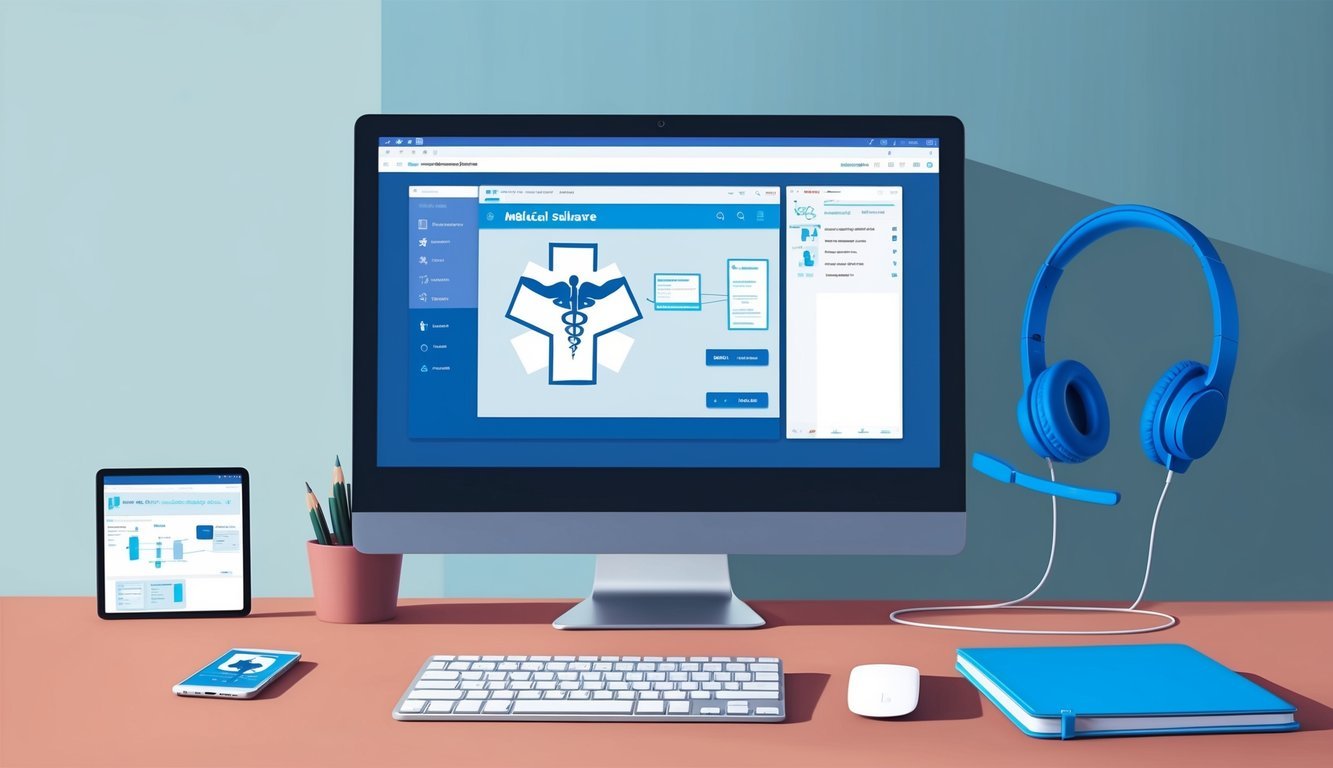Remote triage nurse jobs offer nurses flexibility in their careers.
These positions allow you to provide vital medical advice and support from the comfort of your home.
As healthcare continues to evolve, the demand for remote roles is on the rise, offering competitive salaries and the chance to maintain a work-life balance.
In these roles, you will typically handle inbound calls from patients and assess their healthcare needs.
You will need to possess certain qualifications and skills, both technical and interpersonal, to succeed.
Understanding the qualifications required and how to effectively apply for these jobs is essential for launching your remote nursing career.
As you explore the possibilities within remote triage nursing, you may also find opportunities for career growth and advancement.
The combination of clinical expertise and strong communication skills will not only help you thrive in your role but also enhance your overall job satisfaction.
Key Takeaways
- Remote triage nursing offers flexibility while providing critical healthcare support.
- Key qualifications and skills are necessary to succeed in remote nursing positions.
- There are many opportunities for career growth and work-life balance in this field.
Understanding Remote Triage Nursing
Remote triage nursing allows you to provide crucial medical assistance from home.
It combines your clinical expertise with the flexibility of telehealth, enabling patients to receive timely advice without visiting healthcare facilities.
Role and Responsibilities
As a remote triage nurse, your primary role is to assess patient symptoms over the phone or online.
You gather information about their health concerns and determine the best course of action.
Your responsibilities typically include:
- Conducting assessments: You ask targeted questions to gather details about the patient’s condition. This helps you understand the urgency of their needs.
- Providing advice: Based on your assessment, you offer medical guidance. You may suggest self-care options or advise them to seek additional treatment.
- Collaborating with healthcare teams: You often work closely with doctors and specialists to ensure patient care is appropriate. Effective communication is vital here.
You may handle calls for various conditions, sometimes focusing on specific areas like pediatrics, emergency room needs, or behavioral health.
Types of Triage Nursing
Triage nursing can occur in various settings.
Each type may have its unique focus and patient population.
Here are some common types of remote triage nursing:
| Type of Triage Nursing | Description |
|---|---|
| Emergency Room | Assesses patients with urgent needs |
| Urgent Care | Focuses on non-life-threatening issues |
| Primary Care | Manages chronic conditions and routine inquiries |
| Pediatrics | Specializes in children’s health concerns |
| OB/GYN | Addresses women’s reproductive health |
| Internal Medicine | Looks at adult health issues in depth |
| Behavioral Health | Supports mental health and wellness needs |
Each area requires specific knowledge and skills to effectively manage the unique challenges of the patients you encounter.
Setting and Specializations
Remote triage nursing can take place in many settings, including hospitals, clinics, and telehealth companies.
The nature of your work can vary based on where you are employed.
- Telehealth Companies: Often, you’ll work from home, providing support for various healthcare needs directly to patients.
- Health Insurance Providers: You might help guide insured clients to suitable healthcare resources.
- Clinical Specialties: Depending on your qualifications, you could focus on pediatrics, OB/GYN, or internal medicine. Each specialty requires tailored expertise to meet patient needs effectively.
This flexible setting allows you to utilize your skills while maintaining a work-life balance.
Remote triage nursing is an essential role in today’s healthcare landscape, ensuring that patients get the advice they need promptly.
For more on remote triage nurse jobs, you can visit Indeed.
Qualifications and Licensing

To work as a remote triage nurse, there are important education and licensing requirements that you must meet.
Understanding these can help you prepare for this career path and ensure you are qualified for the positions available.
Necessary Education
You need to complete a nursing program, which can be either an Associate Degree in Nursing (ADN) or a Bachelor of Science in Nursing (BSN).
A BSN is often preferred by employers and may give you an edge in your job search.
These programs offer essential training in patient care, anatomy, and medical ethics.
To enroll in one of these programs, you typically need a high school diploma or GED.
After graduation, passing the National Council Licensure Examination (NCLEX-RN) is necessary to become a licensed registered nurse.
Many remote positions may also prefer candidates with clinical experience.
RN Licensure
After completing your nursing education, you must obtain your RN license.
This license is crucial as it permits you to practice as a registered nurse.
Each state has its own requirements, so checking the specific regulations where you plan to work is essential.
Consider applying for a compact RN license, which allows you to practice in multiple states without needing separate licenses.
This flexibility can be beneficial for remote work, as you may assist patients across state lines.
More information about compact licenses can be found on the NCSBN website.
Specialty Certifications
Though not always required, obtaining specialty certifications can enhance your qualifications and appeal to employers.
For remote triage nursing, certifications such as the Certified Triage Nurse (CTN) or Certified Nurse Practitioner (CNP) are beneficial.
Specialty certifications demonstrate your expertise and commitment to the field.
Maintaining these certifications requires ongoing education, which helps you stay updated on best practices in triage and patient care.
In some cases, employers may prefer candidates with experience in specific areas, like pediatric triage or telehealth nursing.
Highlighting any relevant certifications can strengthen your job applications.
Job Application and Employment Standards
When applying for remote triage nurse positions, understanding the application process and employment standards is essential.
You need to focus on preparing your resume effectively and knowing how to interpret job listings accurately.
Resume and Interview Preparation
Your resume should highlight relevant nursing experience, particularly in triage and comprehensive care.
Include specific skills that demonstrate your ability to assess patient needs and provide medical advice.
Key elements to include:
- Contact Information: Make sure this is clear and up-to-date.
- Professional Summary: A brief statement about your qualifications.
- Experience: List positions held, emphasizing triage roles.
- Certifications: Include licenses and any specialized training.
Before the interview, research the employer to understand their culture and benefits package.
This knowledge allows you to ask informed questions.
Practice common interview questions related to triage nursing, focusing on scenarios you may face.
Understanding Job Listings
When reviewing job listings for remote triage nurse roles, pay attention to the requirements.
Employers often seek candidates with relevant experience and specific certifications.
Look for phrases like “equal opportunity employer,” which indicates a commitment to diversity.
Common requirements might include:
- An active nursing license.
- Previous triage or emergency room (ER) experience.
- Strong communication skills.
Also, check for additional information about benefits packages like health insurance, retirement plans, and paid time off.
Understanding these details will help you assess if the position aligns with your professional and personal needs.
Technical and Soft Skills

As a remote triage nurse, you must possess a combination of clinical competencies and strong communication skills.
These abilities are essential for efficiently performing your duties in patient care and ensuring compliance with healthcare regulations.
Clinical Competencies
You must have a deep understanding of the nursing process and clinical triage.
This includes assessing patient needs and prioritizing care based on urgency.
Key clinical competencies include:
- Proficiency in patient assessment techniques.
- Knowledge of various medical conditions and their treatments.
- Familiarity with electronic medical records (EMR) for documentation.
You will rely on your knowledge to make sound decisions swiftly.
This enables you to determine the appropriate level of care, considering factors like patient history and vital signs.
Understanding HIPAA compliance is also critical to protect patient confidentiality.
Communication and Technology
Effective communication is vital when working remotely.
You use advanced tools like VOIP phones and secure messaging systems for patient interactions.
Key communication skills include:
- Active listening to accurately understand patient concerns.
- Clear verbal and written communication.
- Empathy to build trust with patients.
Additionally, technology plays a crucial role in your daily tasks.
You should be comfortable navigating EMR systems for documentation and care coordination.
Training in these technologies ensures you can efficiently manage patient information while maintaining compliance with regulations.
Work-Life Balance and Career Growth
Remote triage nurse positions offer flexible work options that enhance work-life balance.
Additionally, opportunities for professional growth are abundant in this field.
You can find both part-time and full-time roles that allow you to tailor your career to your lifestyle.
Part-Time and Full-Time Options
Many remote triage nurse jobs provide both part-time and full-time opportunities.
This flexibility allows you to choose a schedule that works for you.
For instance, part-time roles can offer options ranging from 20 to 30 hours per week.
This can be ideal if you are balancing other commitments, such as family or education.
| Job Type | Hours per Week | Benefits |
|---|---|---|
| Part-Time | 20-30 | Work-life balance |
| Full-Time | 40 | Steady income, benefits |
Working full-time can lead to greater financial security and benefits, such as health insurance and paid time off.
Additionally, many companies value interdisciplinary teamwork, giving you the chance to collaborate with various health professionals.
Professional Development
In remote triage nursing, there are significant chances for professional development.
Health education is a crucial component of the role.
By expanding your skills, you can provide better care and support to patients.
Employers often support ongoing training and certifications.
This can include workshops and online courses that keep you updated on best practices in healthcare.
Investing in your skills not only improves your current job performance but can also open doors for promotions and advanced roles.
Building connections with an interdisciplinary team can lead to mentorship opportunities.
This can be invaluable for your career growth.
By engaging with colleagues, you can learn new perspectives and strategies that enhance your practice.
Frequently Asked Questions
This section addresses common questions about remote triage nursing.
You will find details on qualifications, salary expectations, primary duties, part-time opportunities, job searching in California, and the hiring process for entry-level positions.
What qualifications are needed to become a remote triage nurse?
To become a remote triage nurse, you typically need a registered nursing (RN) license.
Many positions prefer or require a Bachelor of Science in Nursing (BSN).
You may also benefit from having experience in emergency nursing or triage settings.
What is the typical salary range for a remote triage nurse?
The salary for a remote triage nurse can vary based on experience and location.
The range is typically between $47,000 and $76,000 per year.
Many nurses in this field can expect a median salary of around $60,000 annually.
What are the primary responsibilities of a virtual triage nurse?
As a virtual triage nurse, your main responsibilities include assessing patient symptoms, providing care advice, and prioritizing treatment needs.
You will use telecommunication tools to interact with patients and guide them to appropriate care options.
Are there part-time opportunities available in remote triage nursing?
Yes, many companies offer part-time opportunities in remote triage nursing.
These positions can provide flexibility for nurses who need to balance other commitments while still practicing their skills.
How can one find remote triage nurse positions in California?
To find remote triage nurse positions in California, you can use job search websites like Glassdoor or Nurse Fern.
These platforms often list available jobs and allow you to filter by location and job type.
What is the hiring process for entry-level remote triage nurse jobs?
The hiring process usually starts with submitting an application and resume.
If selected, you may go through interviews that focus on your nursing skills and ability to manage patient care virtually.
Some employers also require background checks and reference checks before making an offer.

